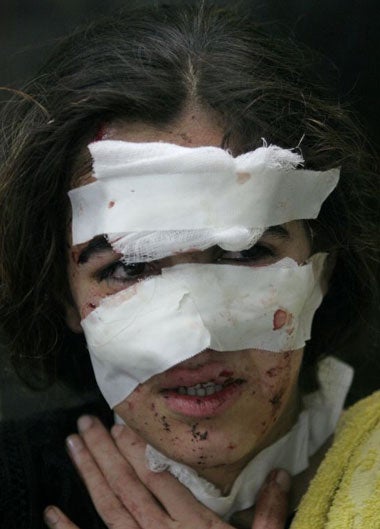Baghdad bomb hinders Straw's unity bid

The most deadly car bomb in more than a month exploded in Baghdad yesterday, as the Foreign Secretary, Jack Straw, attempted to persuade Iraqi leaders to end sectarian rivalries splitting the country. The booby-trapped car exploded at a market in a Shia area of a mostly Sunni district of south-western Baghdad, killing at least 22 people and injuring 30. The attack in Dora, which has been the scene of frequent bombings, came one day after a suicide bomber killed 12 people on a bus in the Iraqi capital in a new wave of terrorist attacks that left 26 dead across the country.
Police said yesterday's car bomb, which set several cars and shops ablaze, had missed its target - a police patrol. The Sunni-dominated insurgents have long targeted the Shia-dominated Iraqi police and recruits in hopes of fuelling sectarian conflict in Iraq. The insurgent attacks have undermined the coalition's troop withdrawal plan which is based on ensuring that the Iraqi police and army are capable of maintaining security. Continued violence could delay American and British plans for a phased withdrawal of the 136,000 US and 8,000 British troops in Iraq.
In Dora, terrified children screamed as several women wailed: "Our children have died" and "the terrorists - may God punish them."
The bomb smashed the street-market stalls, leaving pieces of fruit and vegetables scattered on the street in pools of blood. An Iraqi suspected of detonating the car bomb by remote control was arrested, police said.
Mr Straw arrived in Baghdad on Monday in the hope of persuading Iraqi leaders to agree to a government of national unity that would bar politicians with a sectarian agenda from sensitive posts such as the ministries of defence, the interior and intelligence.
The US ambassador, Zalmay Khalilzad, warned that the Americans could cut aid to key public institutions unless the Iraqi political factions - dominated by the Shia community whose leaders have strong ties to Iran - agreed on a non-sectarian government.
That threat drew a strong response yesterday from Prime Minister Ibrahim al- Jaafari, who has been picked by Shia lawmakers to stay on in the post.
"When someone asks us whether we want a sectarian government the answer is 'no we do not want a sectarian government' - not because the US ambassador says so or issues a warning," he said after talks with Mr Straw. "We do not need anybody to remind us, thank you."
However, Mr Straw repeated the British view that "no ethnic or religious grouping can dominate government".
"This therefore gives further impetus to what Iraqis tell us they want, which is a government of national unity bringing together all the different elements of Iraqi society."
He said that those he met in Baghdad, including Mr Jaafari, agreed that the three key posts should go to "technocrats" free of sectarian and ethnic bias.
Addressing concerns that the majority Shia would try to exclude the Sunni from the government, he responded: "They know that no one party won the election. They also know ... that they themselves are divided and that it's therefore in the strategic interest of each party, however big, to take part in a government of national unity."
Mr Straw was also on a fence-mending visit to minimise fallout from the video of British soldiers abusing Iraqis in southern Iraq. He said military police were conducting an investigation into the incident in 2004.
Join our commenting forum
Join thought-provoking conversations, follow other Independent readers and see their replies
Comments
Bookmark popover
Removed from bookmarks